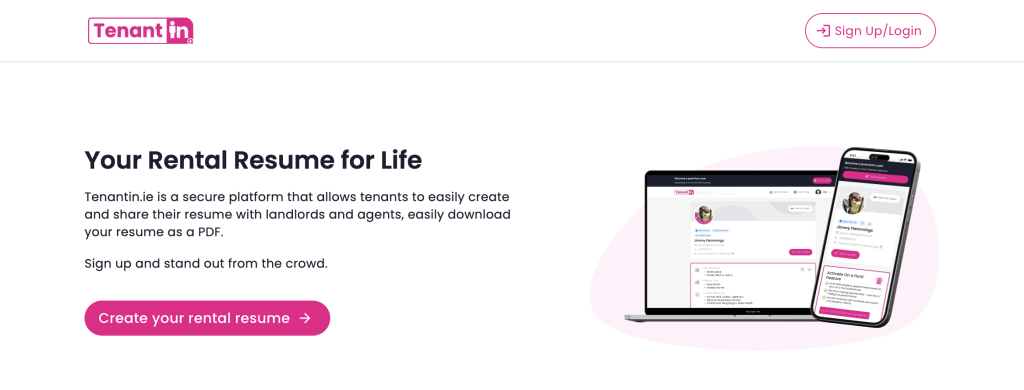In today’s digital-first world, renting an apartment in Ireland without viewing it in person is no longer the risky gamble it once was. Whether you’re moving from abroad, relocating across the country, or simply juggling a hectic schedule, it’s now completely possible to secure a property remotely — and safely. With the right approach and digital tools like Tenantin.ie, tenants can confidently secure a new home without ever stepping inside it beforehand.
Here’s a fool-proof guide on how to rent an apartment in Ireland without viewing it in person.
1. Build a Strong Rental Resume
Landlords and letting agents in Ireland want reliable tenants, especially when dealing with remote applicants. Create a comprehensive rental resume that includes your employment details, references, rental history, and any relevant documents like photo ID and proof of income.
Using a digital tool like Tenantin.ie makes this process seamless. With Tenantin.ie, you can build a professional rental profile — think of it as your rental CV — that you can share instantly with landlords and agencies. This builds trust and speeds up the rental process significantly.
2. Use Verified Rental Platforms Only
To avoid scams and false listings, always stick to verified Irish property sites like FindQo.ie. Scammers often prey on those renting remotely, so be cautious of ads on social media or unverified websites offering “too good to be true” deals.
Tenantin.ie’s premium feature, On a Hunt, integrates with FindQo.ie to automatically match you with suitable listings and send your rental resume directly to landlords — reducing time spent browsing and increasing your chances of securing a property.
3. Request a Virtual Tour or Video Walkthrough
Most professional landlords and agencies in Ireland now offer virtual viewings or video walkthroughs as standard. Request one if it’s not already provided in the listing. This gives you a clear sense of the property’s layout, size, and condition.
Don’t be afraid to ask for a live video call, especially if you’re dealing directly with a landlord. Seeing the place in real-time, even through a screen, can provide peace of mind.
4. Check the Property on Google Maps and Street View
Use Google Maps to explore the neighbourhood. Street View can show you the exterior of the property, nearby shops, public transport, and overall area vibe. This is particularly helpful when renting in places like Dublin, Cork, or Galway, where location is just as important as the home itself.
5. Join Irish Rental Forums and Facebook Groups
While social platforms can be risky for actual rentals, Irish tenant communities on Reddit and Facebook can provide valuable advice and even referrals. Join groups like “Renting in Dublin” or “Irish Housing Network” to ask questions or get landlord feedback.
However, when it’s time to secure a property, always return to verified tools like Tenantin.ie and FindQo.ie to close the deal safely.
6. Be Transparent with Your Landlord or Letting Agent
Tell the landlord from the start that you’re applying remotely and won’t be able to attend an in-person viewing. Most are now used to remote applicants, especially for high-demand cities like Dublin or Galway. Demonstrating responsibility and transparency can work in your favour.
Pairing that with a professional Tenantin.ie profile shows you’re serious and organised, making landlords more likely to consider you without a face-to-face meeting.
7. Confirm All Details in Writing
Always get rental agreements, terms, and deposit details in writing before sending any money. Ask for a lease draft and read it carefully. Ensure you understand the length of the tenancy, break clauses, utility responsibilities, and notice periods.
Avoid paying cash or wiring money to unknown bank accounts. Professional agents and landlords in Ireland typically use secure methods and provide proper documentation.
8. Use Local References and Guarantors Where Possible
If you’re new to Ireland or renting from abroad, Irish references or a local guarantor can boost your application. A previous employer, Irish-based family member, or friend who can vouch for you may help convince a landlord to accept you without viewing the property.
Tenantin.ie allows you to attach references to your rental resume so everything is in one place and easy for landlords to review.
9. Act Fast and Follow Up Regularly
The Irish rental market moves quickly — especially in high-demand areas like Dublin, Limerick, or Cork. If you see a property that fits your needs, send your rental resume immediately. Delay can mean losing out.
With Tenantin.ie’s On a Hunt feature, your rental resume is automatically submitted to listings that match your preferences, giving you a competitive edge without having to manually contact every landlord.
10. Trust Your Instincts and Use Verified Services
If something feels off — the landlord is pressuring you, the listing is vague, or the payment terms seem odd — don’t proceed. Scams targeting remote renters exist, but you can avoid them by using trusted rental platforms and services.
Tenantin.ie was built specifically to make the rental process easier and safer for Irish tenants. It helps you create a rental profile, automate your rental hunt, and stand out in a highly competitive market — all without having to leave your home.

Conclusion: Renting Remotely in Ireland Is Possible — and Safe — with the Right Tools
Renting an apartment in Ireland without viewing is not only possible — it’s becoming increasingly common. Whether you’re abroad, managing a busy life, or simply want to avoid long commutes for viewings, digital tools like Tenantin.ie offer a trustworthy way to find and secure a place remotely.
By combining a strong rental resume, verified platforms, proactive communication, and digital tools like On a Hunt, you can confidently rent an apartment in Ireland without ever attending a viewing. The process may feel unconventional, but with proper planning and platforms built for the Irish rental market, it can be just as effective — and far more convenient.






